- Home
- Marthe Jocelyn
Secrets Page 11
Secrets Read online
Page 11
I can tell Mom is irritated, but she’s staying calm.
I don’t want to be here. Why am I here? I want to be home. I want to be at Emily’s. I want to be watching a movie on TV and prank phone-calling someone.
“I’m sure they’re in there,” says Mom.
I’ve seen my mom behave in the exact way that Grammy is now – a tornado of worry – but here Mom is, soothing her mother, saying she’s sure she has the directions somewhere. And, of course, she does. She finds them, finally, at the bottom of the bag.
“Have we got to exit 7a yet?” asks Grammy.
“7a? On which road?”
“On route 4, going north.”
“We’re not on route 4, going north yet. We’re still on the highway.”
“Oh.”
The conversation goes like this for several minutes.
Grammy starts turning her paper around, as if she can’t read it. “The real problem is, I can’t see a thing without my glasses….”
“Where are your glasses?”
Grammy starts rummaging through her bag again.
“Grammy, what are those around your neck?” She’s got one pair on her nose and another around her neck.
“Oh! I’m such a fool. Thank you, Evie, yes.” She pulls the ones off her nose and jams on the others and starts reading the paper again. “I just can’t quite tell….”
“Ma,” says Mom. “Give the paper to Evie – maybe she can tell where we are.”
“No, no. I can see it now,” says Grammy. “We should be looking for route 4. Route 4 and then exit 7a. That goes to route 22 and right into Burlington.”
I lie down, on my back, with one leg crossed over the other. I turn my music up loud. I watch the tops of the trees whir by, and I think we will never get where we are going. For a minute I think I fall asleep and, when I wake up, I can see that evening is coming.
*
Grammy is talking about Gina again
“After all, it was her ex-husband, Tom, who introduced me to Grandpa in the first place,” she says.
“I was always scared of Tom,” says Mom.
“So was I!” says Grammy. “I don’t know if I would have gotten married if I hadn’t been so scared of him. I couldn’t decide; Grandpa was ten years older. My family didn’t want me to marry him at all. But Gina’s husband told me, ’I’ve canceled my appointments today. Either get married, or call it off.’”
I’m still lying down with my headphones on. But I’ve turned the music off.
“I didn’t know your family didn’t want you to marry him,” says Mom.
“Well, he was so wild,” says Grammy. “He took me places that my family would never go. Nightclubs and restaurants – he even took me to a prizefight.”
“Well, you stood up to them, didn’t you?” says Mom.
“Did I?” says Grammy. “Or was it just that Tom Hambly canceled his appointments that day?”
“But the roses!”
“Yes, I know,” says Grammy. “Grandpa turned out to be a wonderful person, he really did. My mother always said how she ended up liking him a lot better than she liked me.” And her face crumples, again.
“Oh, Mom, there’s a sign for route 4!”
“Oh, good work, Evie,” says Mom.
“Well, thank heaven someone can see in this group!” says Grammy, sniffing and laughing.
It seems like forever until we get to exit 7a, which is route 22 to Burlington. Dusk has settled in, and the mountains are black against a lavender sky.
“What’s the name of the street the hotel is on?” Mom asks Grammy, who’s still clutching the directions.
“Hopkins Street,” says Grammy. “It says….”
Hopkins Street is a long bright street, on the edge of Lake Champlain. I know Mom found a hotel with a view of the lake because she thought it would be nice for Grammy. I know she chose the most expensive hotel because she thought it would have the cleanest bathrooms.
“It seems like the kind of thing Grandpa would do,” she told me, while she was on hold for the reservation.
“Look for the Westwood Hotel,” she says to us now.
“Goodness,” says Grammy. “So many people.”
“I see it, Mom!” I shout. “Right up ahead, on the corner there.”
The Westwood Hotel has a thousand windows gleaming with the reflection of the wide silvery water of Lake Champlain. I sense it is not what Grammy was hoping for. She is sinking in her seat and the atmosphere of our car shifts, from excitement to a slight dread.
I know Mom has to feel it – the dread coming from her own mother – but she’s ignoring it. She’s looking for the parking.
“Over there, Mom,” I say. “See? It’s one of those underground garages.”
The dread thickens.
“Underground garage?” says Grammy.
“It’s not a big deal, Ma,” says Mom. “Haven’t you ever been in one of those underground garages, at the airport or someplace?”
Mom knows perfectly well that Grammy has never been in an underground garage. Grammy lives in her green garden and her sun-filled house, in an overlit supermarket or a fluorescent hospital room, in her flowery upstairs bedroom and her old book-lined library. She has never, ever, been underground – except to check for leaks in her own basement.
Mom turns into the garage and drives slowly down the ramp. Grammy is breathing in a shallow way and holding her bag in her lap.
“Like entering the gates of hell, right, Ma?” says my mom, lightly. “Except it’s just a parking garage.”
Grammy smiles and forces a small laugh. I’ve been in a million underground parking garages and never thought twice about it. But somehow, driving down with Grammy, it does seem kind of creepy, going down and down in a tight circle.
“Here, Mom. ‘PARKING AVAILABLE’,” I say. “LEVEL 3.”
We turn slowly onto level 3. The concrete ceiling feels too low and the pillars are rough and thick. We all sit for a minute in the car, not quite ready to brave this dark close place we find ourselves in.
“Okay, come on,” says Mom, cheerfully. “We just have to find the elevator.”
“Elevator?” says Grammy.
I feel a little sorry for Mom. She meant so well, taking Grammy to the nicest hotel she could find. And now here we are in an underground parking garage with a person who is revealing she’s not keen on elevators, either. It’s like we lost our way along the sunny path we were traveling, and somehow found ourselves in the thick of the forest.
“Come on, Grammy,” I say. “Elevators aren’t so bad. They’re quick.”
We get out of the car. The scenery is too grim for Mom to even try to cheer Grammy up. Without speaking, we herd my small, withering grandmother into the elevator and push the button for LOBBY.
“Finally!” says Mom, ten seconds later when the doors open. We have to wind our way past a glittering fountain and blazing chandeliers to get to the front desk. Grammy is shrinking in front of my eyes. My mother, on the other hand, is looking taller than usual.
“Evie, why don’t you and Grammy sit right there while I check in?” she says, in a hard voice.
Grammy and I sit on some fat chairs, with maroon-and-green striped upholstery.
“I’m sorry, Evie,” she says to me, softly. “It’s all so overwhelming, the garage and the lights. I haven’t been anywhere in so very long.”
I am torn between sympathy for her and sympathy for my mother. I wish that I was at home, sitting at the computer, or meeting my friends at Cosimo’s for pizza. I wish, at least, I had my headphones on, with my music as loud as it goes.
“It’s okay, Grammy,” I say, and I pat her soft hand. “It’ll be okay.”
Mom comes back, still looking tall and tight. But when she sees her mother, she softens. “Okay, Ma,” she says. “I got the keys. One more elevator and we’ll be safe in our room.” Grammy and I slide off the fat striped chairs and follow Mom.
None of us are talking. I’m mad ab
out not being in a booth at Cosimo’s; Mom is disappointed because her plan for making Grammy happy is not working; and Grammy is just sad and frightened, wishing with all her heart to have her old life back, which is gone forever.
We get out of the elevator into a long hallway, with doors going in both directions. The floor is carpeted in red-and-gold swirls and the walls are papered in a silver flower pattern.
“This way,” says Mom. She has given up trying to be cheerful. “I got two rooms so Evie can watch her own TV, but there’s a connecting door so we can feel like we’re all together.”
She opens the door and we stand there, faced with big brown furniture. Mom puts her bag on one of the beds and opens the door to the next room.
“Here we go,” she says. She knows she has lost the war, but she seems willing to fight the battle through to the end. Grammy follows her in and puts her suitcase down. Mom pulls open the curtains. We stare at the view; the sky is purple and quilted, the lake a dark shimmer.
I feel relieved that we all know where we stand. It is clear that Grammy is not ready to face the world, even with lake views and expensive hotel rooms. Our mission has been reduced to getting through the next day until we can turn around and go home. It’s as if Grammy has revealed herself as disabled and now we simply need to protect her until she is back in a safe environment. There is no real point in trying to make her happy.
Grammy walks over and peers in the bathroom. “Oops, I forgot my Lysol,” she says, and we all laugh together.
“Let’s have dinner in the restaurant here,” says Mom. “I doubt the food will be good, but at least it’s right here.” Grammy and I say that’s fine.
It’s hard to explain why we have such a peaceful dinner, after a day with so much upheaval. I know Mom had higher hopes for this trip, and I am guessing that Grammy did, too, or she wouldn’t have been willing to come.
I didn’t want to be here at all, but I think I’m glad that I came. It’s like, with our three different paces, we tried to climb a mountain that was too hard to climb. We never made it to the top, but along the way we found a place where we could be together.
This restaurant at the Westwood Hotel, in Burlington, Vermont, feels like a small green meadow on the harsh side of a cold gray mountain.
That night, late, when I am watching TV and Mom is sleeping, I hear Grammy crying in the other room. I tiptoe over and slide in next to her. I hold on to her tightly while she cries and cries and cries.
After a while, she stops.
“I’m sorry, Evie,” she says. “I was trying to turn on the TV to watch the food channel, like I did with Grandpa, but I couldn’t figure out how to do it. Isn’t that silly? It was the remote control that made me cry so hard. That stupid thing made me realize that Grandpa is really gone.”
“Oh, Grammy,” I say. I’m pretty sure neither of us is tired. “Shall we see what’s on the food channel?” I turn it on and together we watch.
“On the way home, Grammy,” I say, holding her small velvet hand, “we’ll stop at McDonald’s. On the way home, we’ll get the right kind of chicken sandwich.”
Grammy laughs. “You know what, Evie?” she says. “I’m looking forward to that.”
Meet the Authors
Susan Adach
Susan was bitten by the writing bug in grade five, when she won the prize for English composition. She now works for the premier of Ontario, helping with his speeches. At night, she writes stories about mitten hunters, the true story of the cow jumping over the moon, or the story of a boy whose brother disappears under the bed. She lives in a teeny house in Toronto with her family: husband, Richard, daughter, Jessica, and cat, Merry.
One of Susan’s favorite books was Gidget by Frederick Kohner.
Anne Laurel Carter
Anne left Don Mills, when she was seventeen, to travel and work in other countries. She returned to Canada to become a teacher and has taught in Northern Quebec and Southern Ontario. While horses often find a way into her stories (Under a Prairie Sky, My Home Bay, Last Chance Bay), she’s still hoping to learn how to ride bareback in the circus ring.
One of Anne’s favorite books was Mara, Daughter of the Nile by Eloise McGraw.
Gillian Chan
Gillian was born in England. Because her father was an officer with the Royal Air Force, the family moved every two years. This led to Gillian being a good observer, a useful characteristic in a writer. Gillian taught high school before becoming a full-time author. She has written short stories for adults as well as for kids, and several children’s novels, including the prize-winning The Carved Box and A Foreign Field, and, most recently, The Turning. She lives with her husband and her son.
One of Gillian’s favorite books was The Chrysalids by John Wyndham.
Anne Gray
Anne was born in Mobile, Alabama, the youngest of four siblings. Between chores, her mother says Anne always had her nose in a book. She has had other stories published in magazines, but Uncle Cory’s Smile is the first one in a book. Now she is married and lives in Hamilton, Ontario, where she’s completing her first fantasy novel for teenagers.
One of Anne’s favorite books was Lad: A Dog by Albert Payson Terhune.
Nancy Hartry
Nancy is the author of two picture books: Hold On, McGinty! and Jocelyn and the Ballerina. She is always stealing story ideas from her kids, her family, and complete strangers in restaurants. She wears mirrored sunglasses and carries a notebook wherever she goes. When she is not writing stories, she works as a lawyer. During her breaks, she spies on the people in the park and makes up stories about them. Watch out. You could be next.
One of Nancy’s favorite books was A Wrinkle in Time by Madeleine L’Engle.
Marthe Jocelyn
Marthe grew up in the east end of Toronto, known as The Beaches. With her sister and two brothers, she often put on plays or circuses in the backyard. She loved to read and organized a lending library, using her own books, each with a hand-printed library card. As she got older, Marthe had many different jobs, including waitress, sailor, and toy designer before finally publishing her first book, The Invisible Day, when she was forty. Since then, she has written eleven books, some of which she also illustrated. Marthe’s husband, Tom Slaughter, is an artist too. They have two daughters, Hannah and Nell, and a cat named Moe, who thinks she’s a dog.
One of Marthe’s favorite books was The Borrowers by Mary Norton.
Julie Johnston
Julie was born in Smiths Falls, Ontario. Since high school, she has been writing short stories, magazine articles, plays, and novels. Her work, including The Only Outcast and In Spite of Killer Bees, has won many awards. Her most recent book, Susanna’s Quill, was published in the fall of 2004. She now writes full-time, both in Peterborough, where she lives with her husband, and at their cottage on Big Rideau Lake, where she spends her summers. Julie and her husband have four daughters and seven grandchildren.
One of Julie’s favorite books was Anne of the Island by Lucy Maud Montgomery.
Dayal Kaur Khalsa
Dayal Kaur Khalsa was born in Queens, New York. She traveled for many years before settling in Canada, where she wrote and illustrated stories about her childhood: her love for her gambling grandmother; her desire for a pet dog; the wonderful day she discovered pizza. Dayal Kaur Khalsa wrote and illustrated eight books in the three years before her death (in 1989), each life-affirming work created while she was seriously ill. Her legacy – Tales of a Gambling Grandma, I Want a Dog, How Pizza Came to Our Town, Sleepers, My Family Vacation, Cowboy Dreams, Julian, and The Snow Cat – is an outstanding testament to a brave and talented artist.
Loris Lesynski
While creating her most recent book of verse, Zigzag: Zoems for Zindergarten, Loris Lesynski had to spend so many hours in rambunctious kindergartens that writing for old people in middle school makes a welcome change. Loris is also the author and illustrator of many picture books and poetry collections, starting with the curiousl
y popular Boy Soup and including Dirty Dog Boogie, Nothing Beats a Pizza, and Cabbagehead. She’s currently at work on a middle-grade novel called The Nevers.
One of Loris’s favorite books was A Tree Grows in Brooklyn by Betty Smith.
Martha Slaughter
Martha grew up in Pennsylvania with two sisters and two dogs. In the eighth grade, she wrote a play called Symmetry, which her classmates performed at the end of the year. She is now the publisher of a literary magazine called Gumbo. She has three children – Sam, Joe, and Willa – and a pesky dog named Lizzy. Although she has written dozens of stories for adults, Road Trip is her first one for children.
One of Martha’s favorite books was The Song of the Lark by Willa Cather.
Teresa Toten
Like most kids, Teresa grew up in a house bursting with secrets. Unfortunately, they usually burst out of Teresa too, along with a lot of extra bits to make them “even more interesting.” Apparently, this was a bad thing. Teresa kept getting into trouble over spilt secrets until someone explained that if you write them down and call them a story, you’re considered a writer. Apparently, this was a good thing. Her first two books of secrets are The Onlyhouse and The Game. Teresa’s first picture book is called Bright Red Kisses and it’s full of kisses, not secrets.
One of Teresa’s favorite books was The Sword in the Stone by T.H. White.
Elizabeth Winthrop
Elizabeth Winthrop is the author of over fifty books for children and adults, including Island of Justice, The Castle in the Attic, Dumpy LaRue, and Dog Show. Her short stories have been collected in various anthologies including Best American Short Stories and have twice won the PEN Syndicated Fiction Award. Among her many honors, she has won a number of state book awards for her middle-grade fiction.

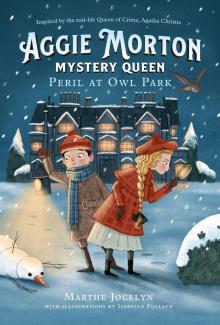 Peril at Owl Park
Peril at Owl Park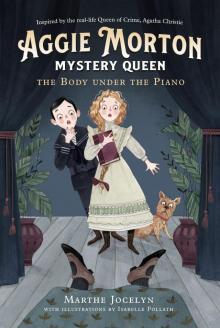 The Body under the Piano
The Body under the Piano Mable Riley
Mable Riley Earthly Astonishments
Earthly Astonishments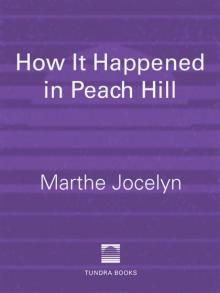 How It Happened in Peach Hill
How It Happened in Peach Hill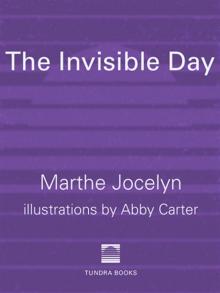 The Invisible Day
The Invisible Day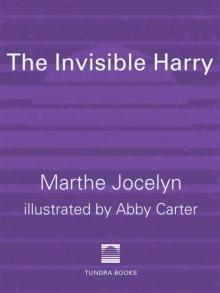 The Invisible Harry
The Invisible Harry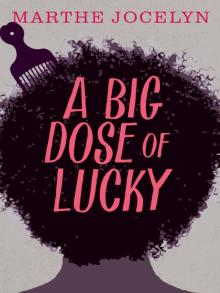 A Big Dose of Lucky
A Big Dose of Lucky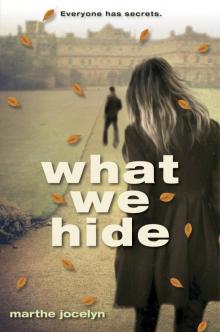 What We Hide
What We Hide Would You
Would You Secrets
Secrets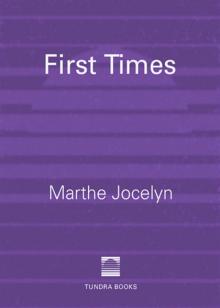 First Times
First Times The Invisible Enemy
The Invisible Enemy Folly
Folly